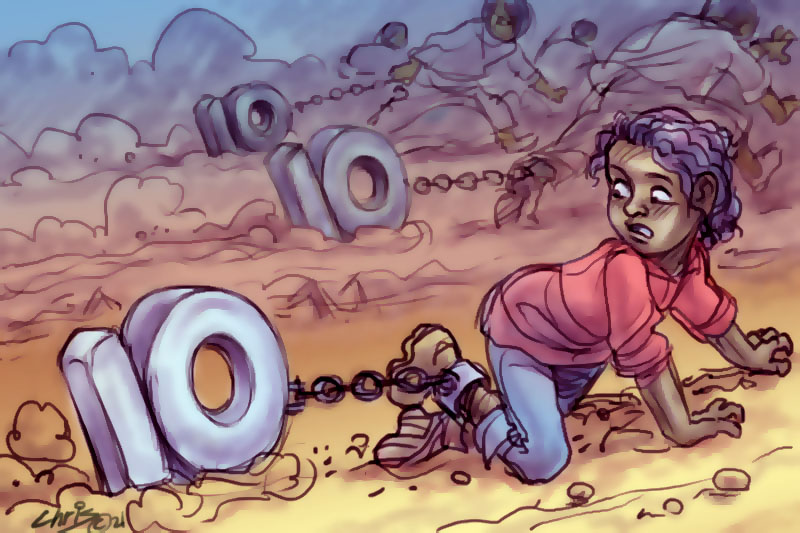Extract from Eureka Street
- Celeste Liddle
- 15 June 2021
I will never forget the day I was told that I was going to become an Aunty. I had just landed back in Australia after a fantastic solo holiday in Thailand. Whilst on the SkyBus, I called my parents to let them know all was well and I was on my way home. I asked dad what I had missed and was told that not one, but two babies were on their way. I just about fell off my bus seat. Several months later, within five weeks of each other my two nephews were born — one tiny, the other plump, and both completely perfect.

Those two little boys turn ten this year, reaching a milestone most Australians celebrate simply as reaching 'double figures'. Yet with these double figures comes a new threat most Australians aren’t aware of: they will also reach the age of criminal responsibility.
Even if most were aware that their ten-year-olds could be taken away and locked up for misdemeanours, it’s not something they would expect to affect their child. For me as an Aboriginal aunty of Aboriginal children, and for most other Aboriginal people, this is a real concern. This concern stems from a history of racist policing and profiling, and from the massive over representation of Aboriginal people in the criminal justice system. We are the most incarcerated people on earth.
Across Australia 65 to 78 per cent of children 10 to 13 years old incarcerated are Aboriginal, yet our kids make up just 5.9 per cent of the childhood population. Of the young children who are imprisoned, 80 per cent will go on to be incarcerated as teens and adults.
As a society, we continue to fail to learn. In 2018 it was noted that 100 per cent of children in juvenile detention in the NT were Indigenous. This is despite the 2016 Royal Commission into the Don Dale Detention Centre after several human rights abuses enacted upon the child detainees were unmasked on a Four Corners report. Despite this Royal Commission, and the various shows of outrage that erupted across the country calling for the closure of Don Dale and the removal of items such as spit hoods, the centre remains open, filled with Aboriginal kids.
Locking vulnerable kids up, rather than supporting them, isn’t making anyone safer. Indeed, it just makes things worse. We know from research key factors leading to kids being imprisoned include poverty, disability and trauma. We know from the inflated numbers for Aboriginal children that structural racism also plays a part. At such young and formative ages to further traumatise these children by putting them through the terrifying experience of being arrested, going before the courts and being locked up away from their families and communities only causes further damage.
'Imagine if instead of criminalising kids, we increased funding to social work organisations, youth centres and other organisations which provide outreach programs for those struggling?'
A couple of weeks ago, in the Victorian Parliament, the second reading of a Greens bill to raise the age of criminality was tabled and debated. It’s incredible to me that The Greens need to take this action and that there should be politicians in the House with them ready to debate that children — primary schoolers — should remain locked up in prisons.
It’s unconscionable, yet it follows an ongoing pattern in this country. “Australia” was founded as a penal colony by the then world superpower. To this day, it remains a place where we preference punishment over community support and services. In 2019, for example, the Andrews government was spending half the national average on social housing yet funnelled $2bn into the building of a 'super prison'. 'Tough on crime' remains an election-winning slogan, even when the roll-out of housing children in adult prisons is blocked by the Supreme Court as being unlawful. Even now, as remandee numbers decreased during the 2020 COVID lockdown, the government fails to commit to exploring other options — options which could benefit socially marginalised youths immensely.
Children in criminal institutions is not proof that some kids are just “bad kids” and need to be locked up. Instead, it is proof of multiple systemic failures and an inability of politicians to think beyond models of punishment. Imagine if instead of criminalising kids, we increased funding to social work organisations, youth centres and other organisations which provide outreach programs for those struggling? What if we ensured that instead of being out on the street, kids had a safe home and space they could go to, particularly when in a violent situation? What if we funded our public education sector with the money going into prisons and policing, so our schools had the capacity to expand support services, inclusive educational opportunities and specialist mentors/advisors? What if, quite simply, we engaged in some real work narrowing the gap between rich and poor in this country?
Australia also needs to examine its overreliance on punishment via a proper truth-telling and treaty process. Perhaps through that, and the extension of proper respect to Indigenous communities, we will begin to see fewer Aboriginal kids locked up and a significantly less racist, more humane and more egalitarian society.
While it’s not the complete answer, I believe that raising the age of criminality is an important stepping stone in undoing the damage the juvenile detention system has done to so many of our children. The legislation in front of Victorian Parliament is an important step in the lessening of transgenerational trauma, particularly in Indigenous communities. I hope that this push will eventually be taken on politically at a national level so other jurisdictions will follow.
 Celeste
Liddle is a trade unionist, a freelance opinion writer and social
commentator. She is the current Greens candidate for the seat of Cooper
in the upcoming Federal elections.
Celeste
Liddle is a trade unionist, a freelance opinion writer and social
commentator. She is the current Greens candidate for the seat of Cooper
in the upcoming Federal elections.
No comments:
Post a Comment